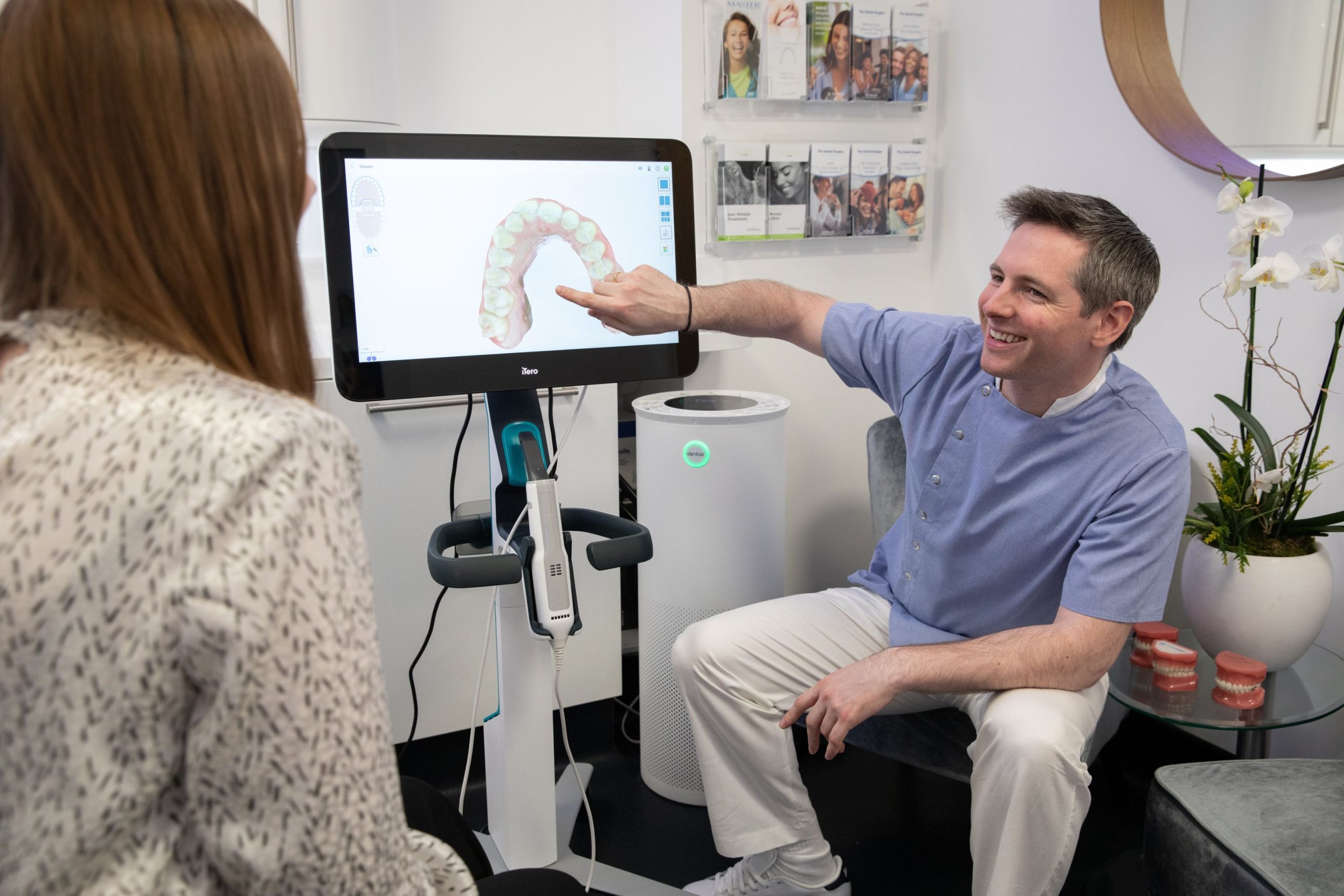- Categorised as:
- Periodontics
- Dental Hygiene
- General Dentistry
What is the Difference Between Periodontitis and Gingivitis?
Periodontitis and gingivitis are conditions that share many symptoms yet also have a number of key differences.
In this post, we look at what both are, how they differ and how to treat or reduce the likelihood of being affected.
To answer how they are different, we must first look at how they are similar.
Periodontitis and Gingivitis: Similarities
Periodontitis and gingivitis are both conditions relating to the gums.
They are both the result of a build-up of bacteria and this build-up is a result of sub-optimal oral hygiene. We say sub-optimal rather than poor because the conditions are so common, in fact, most UK adults have gum problems to some extent. It is hard to prevent the build-up of bacteria over time even with best efforts to brush twice a day, floss and rinse with mouthwash.
While few children or young adults suffer from either gingivitis or periodontitis, many adults over the age of 40 do present with symptoms. For both conditions, it is true to say that the older you are, the more likely you are to have either one condition or the other (if not both).
The fact that both are so common – and we will come to whether they are equally common – can lead to a false sense of security.
If most UK adults have some degree of gum complaint, and gingivitis and periodontitis are gum complaints, then they can’t be that bad, can they? Sadly, safety in numbers might provide a little reassurance but it doesn’t actually help fight the by-products of the conditions.
Which Comes First
Gingivitis always comes before periodontitis. It is an earlier stage and so it is not possible to have periodontitis without first having had gingivitis.
That is not to say that gingivitis will always lead to periodontitis, far from it in fact, nor does it mean there is a consistent pattern of how long it might take for one to lead to the other.
What it does mean is that once someone has gingivitis the potential of contracting periodontitis is increased. That in itself is worrying.
Gingivitis – The First Stage
In the vast majority of cases, gingivitis is caused by plaque build-up and so we will focus on that cause here.
Over time, plaque builds up in areas where the teeth and gums have not been sufficiently cleaned and it is the by-products of the bacteria in this plaque, such as degradative enzymes and toxins, that ultimately leads to gingivitis.
The growing complexity of the bacterial colonies and the toxins and enzymes produced lead to inflammation of the gums and then, potentially, the other unpleasant side effects of gingivitis.
Halitosis
These side effects are things many adults will experience at some stage – bleeding gums from brushing, red and inflamed gums and bad breath (halitosis) being the most common complaints. It is, of course, important to note that all three of those can also be caused by factors unrelated to gingivitis.
Gingivitis is undoubtedly unpleasant, if not necessarily outright painful. Having gums that bleed, red, inflamed gums and bad breath could clearly all affect self-esteem, stress levels and overall mood. What gingivitis will not be doing is causing long term damage. As unwelcome as it might be, it is not a condition that erodes the gums or will lead to tooth loss.
Periodontitis though. That’s a different matter…
Periodontitis – The Real Cause For Concern
Periodontitis is always preceded by gingivitis but gingivitis does not always lead to periodontitis.
Periodontitis is gum disease and, as that implies, is a lot more serious than gingivitis. Whereas the by-products of gingivitis are unpleasant the effects of periodontitis are far more significant.
All the problems of gingivitis will still be present – inflamed gums, bleeding on brushing and potentially eating and bad breath but other, more serious issues occur too.
With periodontitis, the inflammation continues to an extent whereby the bone of the jaw begins to be lost. This can lead to teeth becoming loose, the apparent lengthening of teeth through gum recession and ultimately teeth either falling out or extraction becoming necessary.
Periodontitis has also been linked to an increased likelihood of other conditions – this through numerous studies and highlighted on the NHS website. Conditions include heart disease and diabetes and also problems in pregnancy including pre-eclampsia, premature birth and low birth weight.
Aggressive
Periodontitis can come on aggressively, but equally, it can be far more gradual for others even if they have poor dental hygiene.
A person’s propensity towards suffering from periodontitis is thought to be affected by genetics and lifestyle choices not least their diet and whether or not they drink alcohol or smoke.
What is much harder, impossible to know even without seeing a professional, is whether what is a cause of concern to you is gingivitis, periodontitis or something else.
How To Tell Which You Have
It is not realistically possible for someone experiencing some of the symptoms of either condition to self-diagnose which they have. Furthermore, even if someone could tell which they had that would not help treat the condition.
Assessing the state of your gums is part of every regular dental check-up, through maintaining regular appointments with a dentist they will ensure that any signs of gingivitis or periodontitis are picked up in a timely manner.
Quick Detection Vital
Quick detection of any issues is important as it tackles the unwanted side effects of gingivitis and, perhaps more importantly, reduces the risk of them becoming full-blown periodontitis.
One of the problems dental professionals face is that all too often we only see patients once problems are deep-rooted and established. A patient who visits us only once they are truly concerned about bleeding gums might have had a far less serious condition to tackle if they maintained their regular check-ups.
Ignorance is not bliss – if you have reason to believe you have gingivitis or periodontitis you need to get it checked out. If you live locally, we have a periodontist in London for you.
It might be that you just have mild gingivitis – this is routine for dentists and hygienists. A good professional clean, some recommendations on how to brush and maintain dental hygiene and you will be on your way knowing that the condition has been dealt with.
Bone Damage
If you have periodontitis, there might already have been some damage to the bone around teeth, but further damage may be prevented. The longer the condition is left untreated the more erosion and damage to bone can take place, and other serious consequences such as teeth becoming loose and the danger of losing teeth increases.
There is nothing to be embarrassed about, these are not rare conditions caused by an abject failure to maintain dental hygiene, they are incredibly common conditions that are hard to avoid. Please book that check-up today, our team of dentists, hygienists and periodontal specialist are well-equipped to deal with all dental concerns.
Do you have a specific question?
Get in touch with us today.



